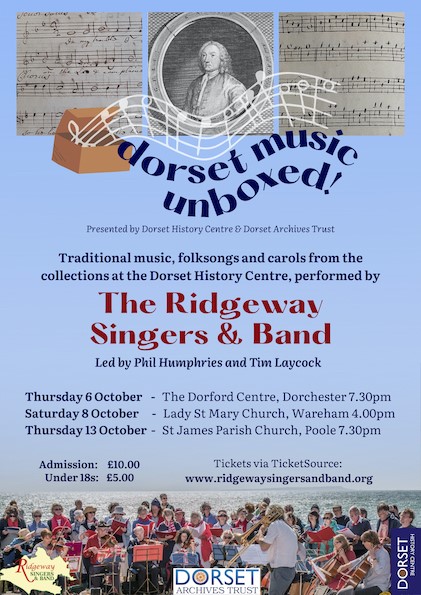‘Times have changed from the Times they used to be; people don’t care about us much now. I’ve been thinking we must be almost the last left in the country of the old String players; Barrel-organs, and they things next door to ‘em that you blow with your foot [ Harmoniums!] have come in terrible of late years…’
– Taken from “Under the Greenwood Tree” by Thomas Hardy
Old Michael Mail would be amazed and delighted to know that, thanks to Thomas Hardy, the tunes and carols that he loved to play would not only survive, but flourish two hundred years later!
Hardy treasured three hand-written books of music, songs, sacred anthems and carols formerly played by his Grandfather [ Thomas Hardy 1st] and his father [ Thomas Hardy 2nd!]
Grandfather played the cello, which he called the bass-viol; and his son played the violin. They were regulars in the Puddletown church band at the beginning of the nineteenth century, before moving to Stinsford to form a string quartet, playing in gallery there to accompany the singing. The characters of the Tranter and Grandfather William in Hardy’s first published novel Under the Greenwood Tree are generally accepted to be based on his father and grandfather; and the stories they told of the exploits of the church bands, and the cause of their demise, became the basis of the storyline of Under the Greenwood Tree and many of Hardy’s other short stories and poems.

One book belonged to Grandfather Hardy, and contains mostly solo lines of music written in the bass clef, as is usual for the cello. Another book belonged to Hardy’s father, and in that most of the melody lines are written in the treble clef. Hardy himself was a good violinist and loved the family dance tunes. He transcribed many of them, together with instructions for a number of country dances, for the Hardy Players to use in their staged adaptations of Hardy novels before and after the First World War. Most of the tunes date from the end of the eighteenth century, and the early years of the nineteenth. The collections contain tunes from Scotland and Ireland, reflecting the musical tastes of the time. Hardy’s preface to Under the Greenwood Tree is well worth reading for anyone interested in the origin of the music, and the world of village musicians of the early nineteenth century.
The names of the tunes are very evocative, and often commemorate great historical events and figures, such as Waterloo, The Tars of the Victory, and Lord Nelson’s Hornpipe; many are concerned with love and romance, such as ‘Kiss Me My Love and Welcome’ and ‘Sweet Jenny Jones’. Hardy uses dance tunes to great literary and dramatic effect in his novels: ‘The Devil’s Dream’ features in The Fiddler of the Reels, the tale of Mop Ollamore, whose music has a bewitching effect on young ladies; and another version of the tune, ‘The Devil Amongst the Tailors’, becomes the downfall of the Longpuddle church band on the Sunday after Christmas in Absentmindedness in a Parish Choir.
In 1947 the first selection of country dance tunes from the Hardy manuscripts was published by DNHAS, edited by Joan Brocklebank and Biddy Kindersley. The book has inspired generations of folk musicians, and still forms the basis of the repertoire of several local country dance bands. Since then, Roger Trim, formerly the violinist with the Yetties, has also produced a larger selection from the original manuscripts. But it’s still a real thrill to see the original books, and to be able to play the very tunes mentioned in Hardy’s writing.
—
In October 2022 the Ridgeway Singers and Band will be performing three shows bringing to life old music from the archives.

Come along and hear some of this wonderful local music played by the Ridgeway singers and Band in their October concerts. ‘Enrico’, reputedly Thomas Hardy’s favourite fiddle tune, will feature in the concert!
You can learn more about the Ridgeway Singers and Band, and book your tickets for one of their shows October, by visiting their website.


Is it possible to view the original music manuscripts?
Hi Ros, you are welcome to visit us to consult the original Thomas Hardy music books. Please send us an email – archives@dorsetcouncil.gov.uk – to arrange an appointment to have a look at them.
Are there any existing recordings of Thomas Hardy playing ? I heard once there was a story of him showing a local theatre group how they should be played.
I am coming to Dorchester from Letchworth, Herts to research Dorset music 1750-1900 approx
I would like to book appointments to spend time with you on 23rd July( all day) and 24th July ( pm) if at all possible.
I hope to have details of ms books from your catalogue, as I did last time, when you were so helpful in showing me the Lulworth manuscripts.
I will try to speak to you next week about the best way to negotiate your catalogue.
Kind regards,
Jenny Ellis
Hi Jenny, we have sent you an email this morning, and look forward to welcoming you to DHC.